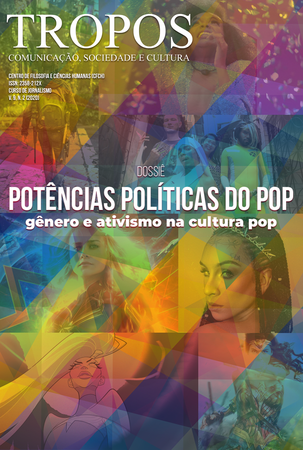“SE ME CALAM É PORQUE MINHA VOZ ASSUSTA”: POLÍTICA E PERFORMANCE MUSICAL A PARTIR DO CANCELAMENTO DE LINN DA QUEBRADA NA PARADA LGBTQ+ DE JOÃO PESSOA (PB)
Palavras-chave:
política, est´ética, música pop, parada LGBTQ, Linn da QuebradaResumo
Neste trabalho tomamos o cancelamento do show de Linn da Quebrada na parada LGBTQ+ de João Pessoa de 2019 como ponto de partida para pensarmos as diversas formas de política protagonizadas por artistas LGBTQ+ que têm aparecido na cultura e especificamente na música brasileira nos últimos anos, e em particular as formas de resistência que emergem nas performances de Linn da Quebrada. A exclusão de Linn da programação de um evento que reúne corpos LGBTQ+ em espaços públicos para reivindicar igualdade de direitos perante a sociedade aponta para um policiamento realizado pela parada (ligado a um policiamento da comunidade LGBTQ+), entendendo “policiamento” na concepção de Rancière (2018), ou seja, como uma distribuição de forma supostamente igualitária que corpos podem ou não aparecer, falar ou ter sua palavra reconhecida como discurso em certo espaço e tempo. Em um primeiro momento, identificamos motivos que ajudam a entender os policiamentos e formas de precariedade (BUTLER, 2018) que atingem Linn, sejam eles restritos ao funk ou à comunidade LGBTQ+, ou envolvendo de maneira generalizada “a sociedade brasileira”, assim como a disrupção que ela promove nesses espaços. Depois disso, analisamos momentos específicos de performances de Linn para entender melhor o potencial político de sua estética, e sua corporeidade de “bixa travesty”. Por fim, analisamos esses momentos a partir de ideias de Rancière (2015) sobre a relação entre ética, estética e política, tensionando e apontando contradições tanto na teoria de Rancière quanto na própria estética de Linn.
Downloads
Referências
BUTLER, Judith. “Corpos Que Pesam: sobre os limites discursivos do sexo”. In: Louro, Guacira Lopes. O corpo educado. 3. ed. Belo Horizonte: Autêntica Editora, 2010.
_____. Problemas de gênero: feminismo e subversão da identidade. 10. ed. Rio de Janeiro: Civilização Brasileira, 2016.
_____. Relatar A Si Mesmo: crítica da violência ética. 1. ed. Belo Horizonte: Autêntica Editora, 2017.
_____. Corpos em aliança e a política das ruas: notas para uma teoria performativa de assembleia. Rio de Janeiro: Civilização Brasileira, 2019.
CAPELHUCHNIK, Laura. A música e os corpos políticos. São Paulo: Nexo Jornal, 2018. Disponível em <https://www.youtube.com/watch?v=W17OoImPFV4>. Acesso em: 18 de jun. de 2020.
CHANTER, Tina. Art, Politics And Rancière: broken perceptions. 1st ed. New York: Bloomsbury Academic, 2018.
DE HOLLANDA, Heloisa Buarque (Org.). Explosão feminista: arte, cultura, política e universidade. 1. ed. São Paulo: Editora Companhia das Letras, 2018.
AUTOR; AUTOR. Título: Subtítulo. ANAIS do XXIX Encontro Anual da Compós, UFMS, Campo Grande, 2020.
FOSTER, Susan Leigh. “Choreographies Of Gender”. In: Signs, v. 24, n. 11, pp. 11-13. Chicago, Outono 1998.
GONZALES, Fernando; NEVES, Thiago Tavares das; POSTINGUEL, Danilo. “O Canto Da Quebrada: aberrâncias audiovisuais, friccionalidades e transgressão do cistema”. In: Encontro Anual da Compós, 28, 2019, Porto Alegre.
HOOKS, bell. Killing Rage: ending racism. 1st ed. New York: Henry Holt And Company, 1995.
LOURO, Guacira Lopes. “Teoria queer – uma política pós-identitária para a educação”. In: Revista Estudos Feministas, vol. 9, n. 2, pp. 541-553. Florianópolis, 2º semestre 2001.
LOURO, Guacira Lopes. Um corpo estranho. Belo Horizonte: Autêntica Editora, 2018.
MARQUES, ngela Cristina Salgueiro; PRADO, Marco Aurélio Máximo. Diálogos E Dissidências: michel foucault e jacques rancière. 1. ed. Curitiba: Appris, 2018.
MOUFFE, Chantal. Sobre O Político. 1. ed. São Paulo: Editora WMF Martins Fontes, 2015.
RANCIÈRE, Jacques. A Partilha Do Sensível: estética e política. 2. ed. São Paulo, Editora 34, 2009.
_____. Aesthetics And Its Discontents. 1st ed. Malden: Polity, 2009a.
_____. “Afterword / The Method Of Equality: an answer to some questions”. 2009b. In: Rockhill, Gabriel; Watts, Philip (Org.). Jacques Rancière: history, politics, aesthetics. 1st ed. Durham: Duke University Press, 2009. Cap. 12, p. 273-288.
_____. O Espectador Emancipado. 1. ed. São Paulo: Editora WMF Martins Fontes, 2012.
_____. Dissensus: on politics and aesthetics. 1st ed. New York: Bloomsbury Academic, 2015.
_____. O Desentendimento: política e filosofia. 1. ed. São Paulo: Editora 34, 2018.
REZENDE, Aline; ROCHA, Rose de Melo. “Diva Da Sarjeta: ideologia enviadescida e blasfêmea pop-profana nas políticas de audiovisualidade da travesti paulistana linn da quebrada”. In: Revista Contracampo, Niterói, v. 38, n. 1, p. 22-34, abr-jun 2019.
ROCKHILL, Gabriel. Radical History & The Politics of Art. 1st ed. New York: Columbia University Press, 2014.
TREVISAN, João. Silvério. Devassos no paraíso: A Homossexualidade no Brasil, da colônia à atualidade. 4. ed. Rio de Janeiro: Objetiva, 2018.
VIEIRA, Helena. “Transfeminismo”. In: DE HOLLANDA, Heloisa Buarque (Org.). Explosão feminista: arte, cultura, política e universidade. 1. ed. São Paulo: Editora Companhia das Letras, 2018.
Downloads
Publicado
Como Citar
Edição
Seção
Licença
Transferência de direitos autorais:
Declaro que após aprovado para publicação a Revista Tropos editada pela Universidade Federal do Acre (UFAC), passará a ter os direitos autorais do trabalho, que se tornarão propriedade exclusiva da Revista, sendo permitida a reprodução total ou parcial desde que devidamente referenciada.

